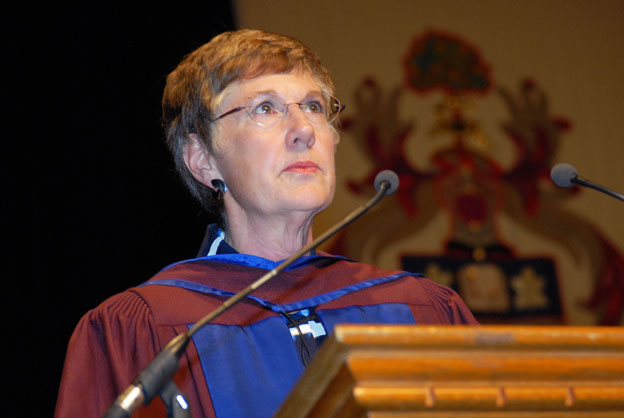‘We are all here today, survivors of every war ever fought’: Chancellor Labarge

Chancellor Suzanne Labarge addressed the McMaster community Nov. 11 at Convocation Hall for the University’s annual Remembrance Day ceremony. She delivered the following remarks, which tell the tragic story of how her father managed to survive the Second World War.
McMaster’s Remembrance Day service brings our University family together to remember and to pay tribute to the men named on the McMaster Honour Roll and, more broadly, to honour all men and women who have given themselves to military service on behalf of our great nation.
I hope that being part of this service today builds our sense of community, both on the McMaster campus and nationally. In the important minutes we spend here in Convocation Hall, we connect not only with each other, but with every Canadian at every Remembrance Day service coast to coast.
As powerful as our campus-wide and even Canadian communities of remembrance are however, we should never lose sight of the importance of this occasion on a personal level.
I have never been part of our Armed Forces. I have never served overseas or watched my siblings or parents go off to fight. But still, Remembrance Day is a deeply personal and affecting time for me.
After my last aunt passed away this summer, my brother, the unofficial family archivist, read through her collection of family letters. Among them was one I want to share with you today.
It was dated April 2nd, 1943. The author was my grandfather, Charles Labarge. He wrote to Mrs. Lorie Wood of Birmingham, England with whom he shared a brief correspondence because of their sons. My grandfather’s son – my uncle Leo – and Mrs. Wood’s only son Philip were both flyers declared missing in action in North Africa. My grandparents and Mrs. Wood were desperate for news, hoping for the best and fearing the worst.
I should mention that at the time, another of my uncles, Leo’s brother Bernard, was also in the Royal Air Force. A third brother, my father Raymond, was serving in the Navy.
This is most of the letter my grandfather sent to Mrs. Wood.
Dear Mrs. Wood:
We were delighted to receive your letter dated February 22nd, and as you probably know by this time, shortly after the date, things began to happen. At least they did with us.
We were hoping and praying that our young son Leo, who is only 21, and who was reported missing at the time, would be reported somewhere as a prisoner of war, but he was finally reported to have been killed and buried some 20 miles outside of Torbuk, Libya with the rest of the crew.
Two days prior to receiving this information, we were notified that our other boy, who is a Pilot Officer operating from England, was reported missing and a few days following that, he was reported killed in action over Germany. Consequently, our contribution to the Air Force is complete.
Yours is a sad case, Mrs. Wood, and we sympathize sincerely with you. At least Providence has seen to it that more children remain with us, but in your case, you have lost your all.
There is not much we can do but hold our heads, and continue to trust in Providence.
We will be delighted to have you keep in touch with us, and the day may yet come when we will meet somewhere and talk over the many things we have in common.
With every good wish for all the health and blessing that Providence might shower on you, I remain on behalf of my wife and our four remaining children,
Yours sincerely,
C.H. Labarge
My uncle Leo was killed on September 30, 1942. My uncle Bernard died on March 12, 1943.
If you are familiar with the film Saving Private Ryan, what happened next will not surprise you. My father, the last surviving Labarge brother in service, was transferred out of harm’s way to the naval base at St. Hyacinthe, Québec where he served out the war training new recruits.
That transfer only occurred, however, after my father – who was trained as a spy – was pulled from a mission when his superior officers discovered he was colour blind. That mission dropped his cohorts behind enemy lines into France. Every man on that mission – the mission that would have been my father’s – was killed.
My father was remarkably lucky to survive the war. The circumstances that made that possible included a great deal of simple chance and, tragically, the deaths of his brothers.
In a way, all of us here today are my father. Everyone in Convocation Hall, everyone at McMaster, is the beneficiary of the same kind of luck. By virtue of the timing of our births or the fates of global geopolitics or perhaps smaller good fortunes, we are all here today, survivors of every war ever fought. We have been spared by luck and, like my father, by the sacrifices of others.
Nothing is more personal.
The lives we live are possible because Canadians like my uncles and the men named on the McMaster Honour Roll fought and died so that we would not have to.
Today, let us consider what we owe to them and to the families that continued to build our country even after their sons and daughters had been called to serve.
Today, let us remember.


